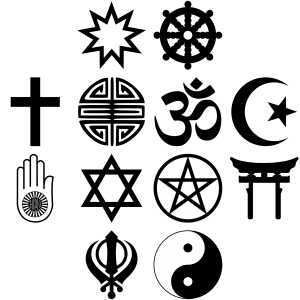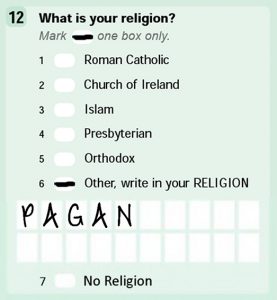 Religion is a difficult question for many people in the 2016 Irish Census. In 2011, 84.2% ticked the box as “Catholic” but it’s quite clear that figure is far higher than the number of actual practising and believing Catholics in the Republic. How can people navigate their way to marking an appropriate box on April 24th? Q. 12 is based on an assumption that most people have not thought about, and many no longer share: that spirituality must be structured by an organised religion.
Religion is a difficult question for many people in the 2016 Irish Census. In 2011, 84.2% ticked the box as “Catholic” but it’s quite clear that figure is far higher than the number of actual practising and believing Catholics in the Republic. How can people navigate their way to marking an appropriate box on April 24th? Q. 12 is based on an assumption that most people have not thought about, and many no longer share: that spirituality must be structured by an organised religion.
Everyone has some spiritual dimension, but organised religions are often focused on institutions, structures and rules rather than people. They’re often like fast food: quick, simple, standardised and not really as good for you as a homemade salad.
Many people mark a box for Q.12 based on the religion in which they were raised, but that isn’t what the question asks – this was clarified on the CSO website and quoted in the Irish Times:
“The question is asking about the person’s current religion or beliefs and not about the religion the person may have been brought up with”
The census exists to gather information for planning resource allocation now, so it is concerned with making provision for the religious beliefs of the population as they now are, and not what your parents chose for you when you were too young to make any sort of choice, informed or not.
The census is intimately linked with the modern, bureaucratic state. It works to service a system where people are packed into neat boxes to which resources can be allocated with some spurious scientific precision. That worldview might work for people who are happy with top down, hierarchical religions, but it has serious limitations, and it certainly doesn’t come close the adequately dealing with spirituality.
There is, of course, a case to be made that in a real Republic, with separation of church and state, questions about religion on the census should be purely for descriptive and historical curiosity, and shouldn’t inform state policy. However, we don’t live in a Republic, we live in a state which is still in many respects a ‘Catholic state for a Catholic people’. Policy decisions will be made on the basis of Q.12, so you need to think carefully about how you answer it.
Marking the ‘No religion’ box does not mean you are atheist, or lacking in a spiritual consciousness. You may be deeply spiritual without being part of any of the denominations offered on the form. You may decide that your beliefs are none of the states business, and should not affect who gets to run schools: I think that might be a case to mark ‘No religion’. The Humanist Association advocate going for the No Religion option. You may have left the religion which you were brought up in, but you haven’t found an alternative which feels right for you: if you are between religions, putting down ‘No Religion’ might be the most honest answer for you.
‘Other’ is also a perfectly fine choice. For many organised religions which are too small to warrant a separate category, all you get is ‘Other’ and a box to write in what you are.
There is a strong campaign to mark ‘Other’ and write in Pagan as a covering term for a wide range of wiccan, witch, shamanic, druid, earth based and, yes, even jedi. Most of those groups share a similar worldview, rooted in nature and the cycles of the year with an emphasis on personal seeking. There are, of course, significant differences under th e broad umbrella, but the argument is that there is more than enough in common to warrant sticking together in an ecumenical way. Pagan Life Rites posted about this, and I’m using the helpful graphic from their site here. It actually speaks to the deep soul of many Irish people and it doesn’t require you to have signed up to anything in particular : many pagans are happy solitary spirits who just like getting along with nature and trying to live in harmony with the world without doing harm.
e broad umbrella, but the argument is that there is more than enough in common to warrant sticking together in an ecumenical way. Pagan Life Rites posted about this, and I’m using the helpful graphic from their site here. It actually speaks to the deep soul of many Irish people and it doesn’t require you to have signed up to anything in particular : many pagans are happy solitary spirits who just like getting along with nature and trying to live in harmony with the world without doing harm.
If you are ‘between religions’, you really should think about your relationship to existence, and work it out for yourself. Some things I did find useful in exploring the question were “Barefoot Doctor’s Handbook for the Urban Warrior: Spiritual Survival Guide”, now out of print be still to be found secondhand. It’s a very hip, urban Taoist book which you will either love or hate. I like everything by Vivianne Crowley, not just her short introductions to Wicca and to Paganism but also her introduction to Jungian Spirituality. In podcasts, Christina Pratt “Why Shamanism Now” is sometimes challenging but always insightful, down to earth and authentic.
You have to answer Q.12, but what you put down is really no bodies business but your own. It’s actually a more serious question than many of the others on the form, and it’s an opportunity for you to take a moment to think seriously about how you chose to answer it. If you are filling out the form for other members of your family, afford them the respect of making their own choice here. Take a few minutes to think about it and treat it as more than just an exercise in checking a box.
Leave a Reply